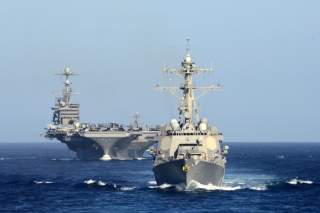This Is Why a Code of Conduct in the South China Sea Can't Wait
If China is unwilling to do so, ASEAN, or a sub-group of like-minded members, should proceed unilaterally
At regional meetings in Kuala Lumpur recently, China attempted to reassure regional nations of its peaceful intentions and deflect attention from its destabilizing activities in the Spratly Island chain in the South China Sea. Speaking to reporters, Chinese Foreign Minister Wang Yi said that Beijing had halted dredging sand to build artificial islands. “China has already stopped. You just take an airplane to take a look,” he maintained.
But Wang said nothing about ongoing construction and militarization of several land features. A 10,000-foot runway is nearly complete on Fiery Cross Reef, and according to Pacific Commander Harry Harris, the Chinese appear to be building hangars for tactical fighters. Satellite imagery also suggests that China may be getting ready to build a second runway on nearby Subi Reef. Early warning radar stations, military barracks, helipads, and lookout towers have been installed on several features and harbors large enough to receive tankers and major surface combatants are being built.
Wang Yi’s remarks were timed to coincide with a series of high level meetings in Malaysia this week led by the Association of Southeast Asian Nations (ASEAN), including the ASEAN Regional Forum and the East Asia Summit Foreign Ministers’ Meeting in which the United States participates. Pressure has been building on China to exercise self-restraint and engage in purposeful dialogue aimed at lowering tensions in the South China Sea.
At the Shangri-La Dialogue in June, Secretary of Defense Ash Carter called for an “immediate and lasting halt to land reclamation by all claimants” and a halt to “further militarization of dispute features.” Earlier this week, ASEAN Secretary-General Le Luong Minh criticized Beijing for “eroding the very trust and confidence . . . between ASEAN and China” through its “reclamation activities, illegal fishing bans and the harassment of fishermen.”
Despite Chinese insistence that ASEAN should not discuss the territorial disputes at the annual ASEAN Foreign Minister’s Meeting, which wass attended by 10 Southeast Asian nations that comprise the organization, Malaysian Prime Minister Najib Razak, host of this year’s series of meetings, said publicly that it was time for ASEAN to “take a more active role” in managing “overlapping claims” and safeguarding regional security.
Sensing the rising angst in the region about its island building in the South China Sea, in the run-up to the meetings this week China attempted to signal a willingness to work with regional players by agreeing to establish hotlines among foreign ministries to respond to maritime emergencies. The efficacy of such hotlines is dubious, however, since coast guards, navies, and maritime militias are not administered by foreign ministries. Moreover, China’s foreign ministry is known to be institutionally weak and is rarely put in charge of handling crises. A maritime rights leading group headed by Xi Jinping is far more powerful.
More importantly, what is urgently needed is a binding Code of Conduct (CoC) to replace the voluntary 2002 Declaration on the Conduct of Parties in the South China Sea (DoC). In talks between China and ASEAN this week, Beijing agreed again to speed up consultations on a CoC, but in practice it is unlikely to do so, at least until it has completed its near-term plan, which may include establishing an Air Defense Identification Zone in the South China Sea and creating the infrastructure to enforce it.
China appears to be increasingly uncomfortable with the growing chorus reproving Chinese activities in the South China Sea. Beijing’s agreement to establish hotlines and quicken the pace of CoC discussions suggests that the Chinese recognize that their behavior is causing greater anxiety amongst their neighbors than they anticipated. So far, however, the pushback has not been sufficient to change China’s calculus, which is that in the long term, Southeast Asian nations will be compelled to accommodate to Chinese interests in the South China Sea. Therefore, greater efforts are needed to persuade China to adopt a more compromising approach that truly emphasizes peaceful management of disputes and respects the interests of all the players regardless of size and military capabilities. To achieve this goal, ASEAN must demand conclusion of a binding CoC before the end of 2015 that contains risk-reduction measures and a dispute settlement mechanism. If China is unwilling to do so, ASEAN, or a sub-group of like-minded members, should proceed unilaterally. The US should do its utmost to help forge this consensus.
This piece first appeared on ATMI’s website here.
Image: U.S. Navy/Flickr.

